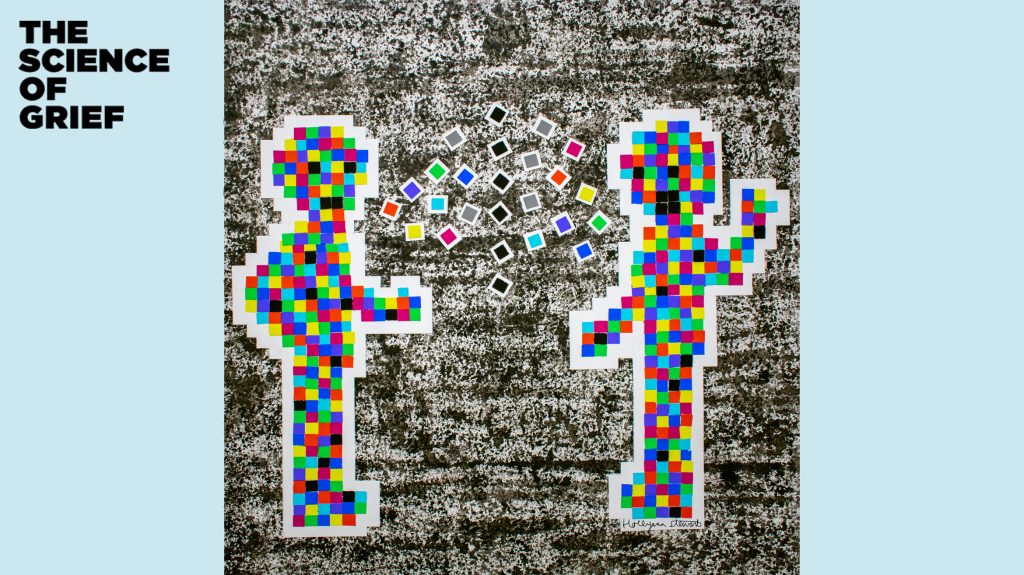On Ghosting and Being Ghosted with Camille Rogers and Aaron Applebey
Meta Stange August 18, 2021Camille Rogers and Aaron Applebey explore both sides of ghosting and the emotional toll it takes on both the ghoster and the ghosted. Social worker Tiera Couch provides guidance on establishing boundaries and fostering healthy communication.

The Science of Grief, produced by WDET and Science Gallery Detroit, explores the stories, science and solutions around grief and mental health, making space for young adults to share their stories, but also lead the conversation.
There are many forms of loss, but one of the most perplexing forms may be ghosting. “Ghosting” is a term that describes abruptly cutting off contact with someone without providing warning or explanation. While there are a lot of reasons friendships can fall apart and different ways to end them, ghosting often leaves unanswered questions in its wake.
The Science of Grief podcast is a collaboration between WDET and Science Gallery Detroit, and is supported by the Children’s Foundation of Michigan, MSUFCU and Science Sandbox.
Never miss an episode.
Subscribe where ever you listen to podcasts:
Apple Podcast — Spotify — NPR — Stitcher — Google Podcasts — TuneInThere are many forms of loss, but one of the most perplexing forms may be ghosting. “Ghosting” is a term that describes abruptly cutting off contact with someone without providing warning or explanation. While there are a lot of reasons friendships can fall apart and different ways to end them, ghosting often leaves unanswered questions in its wake.
“I wish there was an opportunity to discuss what had happened, to make amends, to see what the path forward was, but that didn’t happen and it really messed with me.” –Aaron ApplebeyWhen Science of Grief producer Aaron Applebey was ghosted by a friend, they felt blindsided. “For weeks I was devastated. Feeling insecure and that the trust had been broken,” explains Aaron. “I was thinking how I could get back into the fold, but I also wanted to give them space.” They tried to reestablish contact with their lost friend by sending a letter. Eventually, they came to terms with the fact that the relationship was over, albeit dissatisfied with the way in which it ended. “I see why they felt they should distance themselves. But I wish there was a conversation,” says Aaron. “I wish there was an opportunity to discuss what had happened, to make amends, to see what the path forward was, but that didn’t happen and it really messed with me.” On the other end of the ghosting spectrum, Camille Rogers has ghosted people in their life that they no longer align with. When a lifelong friend spent a weekend with Camille in college, Camille was taken aback by some of their friend’s comments and behaviors and realized that this was not a friendship they wanted to continue to participate in. They started pulling away by blocking the friend on social media and no longer responding to texts.
“I do feel a level of guilt … this was someone I was friends with. I know for me to just suddenly pull away like that, it’s jarring.” –Camille Rogers“I didn’t know what to say,” remembers Camille. “I felt like I had never been in the situation before where I was like I don’t want to be friends with you anymore because you are the way you are.” Camille recognizes that ghosting their friend took an emotional toll on both of them. “I do feel a level of guilt … this was someone I was friends with,” they say. “I know for me to just suddenly pull away like that, it’s jarring.” Both Aaron and Camille experienced grief in their own way. “Friendship is like the seasons and maybe that’s an idea that I’m becoming more accustomed to and I’m feeling more secure in myself that it’s OK when friends need to step away,” says Aaron. “But still, it’s a sadness; it’s a loss and it shouldn’t be ignored; it should be talked about.”
Tips and Takeaways from Tiera Couch
- Ghosting leads to feelings of abandonment and challenges with attachment.
- Communicate as things come up as opposed to waiting for conflict and issues to build up.
- Allow for both sides of the conversation to happen organically rather than going into a dialogue with predetermined expectations.
- Check in with your friends on their feelings and whether they have the emotional bandwidth to support you. If you feel that you’ve become an emotional dumping ground, establish boundaries.
- Tell people what’s bothering you before relationships end.
- Some relationships do end; not everyone is supposed to stay with you forever. Allow yourself to experience the stages of grief and make room for new things.
Previous Episodes of Science of Grief
- Challenging the Stigma Around Suicide with Felicia Frabis
- Learning to Cook and Savoring Life’s Moments with Jackie Garrett
- Living a Full Life with Half a Heart with Sierra Maybury
- Acknowledging Grief and Embracing Therapy with Joshua Watkis
- Setting Healthy Boundaries with Maria LoCicero
- Exploring Unexpected Loss with Aaron Burch
Seeking Help
While this podcast is meant to make space for sharing stories and solutions, it is not a substitute for professional help. If you have a mental health concern and need someone to talk to, please contact a mental health professional or your doctor. If you are in a suicidal crisis or emotional distress, please call the National Suicide Prevention Lifeline: 800-273-8255.The Science of Grief podcast is a collaboration between WDET and Science Gallery Detroit, and is supported by the Children’s Foundation of Michigan, MSUFCU and Science Sandbox.

